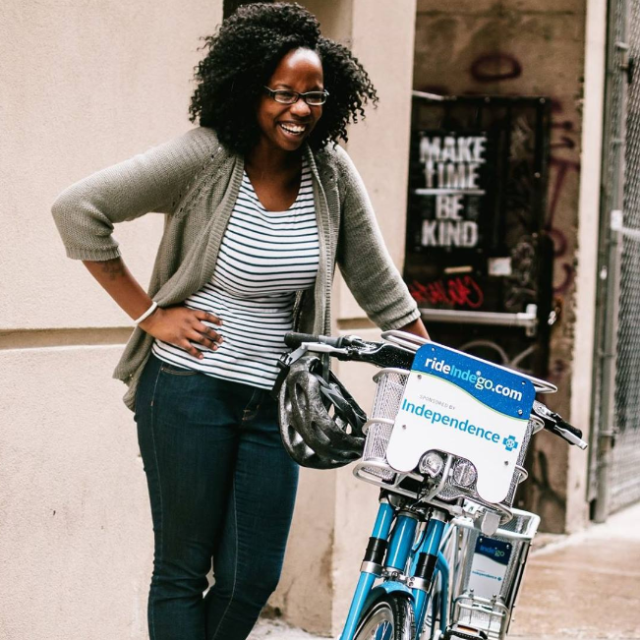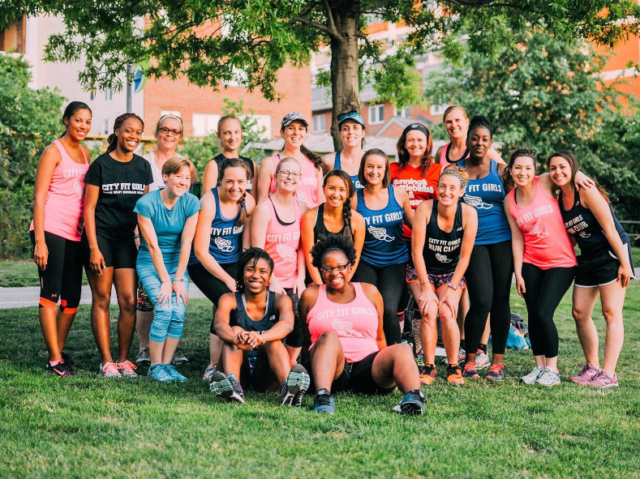Q&A: Exit interview with Kiera Smalls of Bike Transit
by Stefani Cox
February 28, 2018
Kiera Smalls may be headed in a new career direction, but she’s not forgetting about bike share.
Kiera has been with Bicycle Transit Systems, bike share operator for Philadelphia’s Indego and other systems, for 3 years. Along the way, she’s spearheaded marketing and engagement efforts and inclusionary practices in the workplace. In our exit interview with Kiera, she shares some of the work she’s most proud of, along with her vision for equity that extends far beyond the bikes.

Tell us a little about your upcoming transition, and where you’ll be headed next in your career journey.
I will be moving on to join Philly Startup Leaders as their new Executive Director. It’s one of the largest tech networks in the city of Philadelphia. The organization helps local entrepreneurs and new companies connect to resources that help them succeed from start-up to growth. They provide access to educational tools, financial resources, and opportunities for networking.
What are you looking forward to as you take your next steps?
I’m looking forward to seeing Philly Startup Leaders grow to become the go-to resource for emerging and existing entrepreneurs and companies. I’m most excited about new opportunities for growth, networking, success stories, diversity and inclusion, and resource sharing. PSL is in a unique position to connect entrepreneurs, funders, and supporters to each other. I want Philly Startup Leaders to be the first thing someone thinks about when they are having a conversation with a cousin or friend who has a cool idea or tool and needs some direction. I want people to know, “PSL is the place to go to get this kind of support.”
In bike share and with my fitness company, City Fit Girls, I’ve found that people just don’t have access (or awareness) to the tools they need to succeed. Networks really help combat that. With this new role, I will be open to all ideas on how we can help individuals and companies learn and grow.

Turning back to bike share, what are you most proud of in the work you’ve done with Bike Transit over the years?
From the marketing perspective, I’m most excited that Indego has become the go to bike share system for equitable marketing and outreach practices. I was the second employee at Bike Transit, and I’ve been here for 3 years. I was able to get all the feedback from the research we were doing on equity, think through what marketing and outreach could look like for Indego, and test out ideas to see what actually worked.
For instance, we know that people want to see themselves reflected in advertising, so where do we get models for photoshoots, and what do those models look like? Are we paying people to help us out when we need them for campaigns? I’m most proud to have been in the position to go from being the marketing specialist to then overseeing all marketing efforts. That growth over the past years makes me proud, and I’m ecstatic to see people who look like me in Indego’s advertisements and on bikes since Day 1.
From the diversity and inclusion perspective, I’m most proud to have worked with our CEO and leadership to bring the BOOST (Bridge. Observe. Organize. Strengthen. Teach) initiative to life. We’re about 6 to 7 months in, and it’s the culmination of a lot of hard conversations that took place at the marketing level, both through outreach and internally.
What issues do you see as most important for bike equity stakeholders to address in the coming months and years?
We have to ask the question, “What else can we do with the communities we serve?” We have these stations and these bikes, and they are used for various reasons. People use them to connect with families, or get to a job in a pinch. How do we continue to add value to the communities we serve and the communities we should serve? Specifically, in the realms of workforce development, financial support, and job creation. Bike share’s not going to solve all problems, but I do think we should look at other ways it can serve communities beyond the bikes.
I love what people like Oboi Reed are doing with Equiticity. I’m inspired by Tamika Butler’s contributions to public spaces. Here in Philly, the Bicycle Coalition of Greater Philadelphia is approaching Vision Zero from an equitable perspective. Even as I go into the tech industry, I’ll be thinking critically about how I can continue to connect with other organizations and industries to create bridges for access.
Additionally, this industry needs to define what it means to be a diverse and inclusive bike share operator, equipment provider, and system owner. I’m not sure if many other companies do the work that we’re doing at Bike Transit (and with the City of Philadelphia) but I’m sure we could always do more.
Do you have any advice or insights you’d like to share for others within the bike share equity space?
My company, Bike Transit, has done tremendous work over the last 3 or 4 years building reliable, safe systems across the country. It is my hope that we (and all systems) continue to take care of employees and the communities we serve. I want to see us continue to have hard conversations, and challenge each other’s biases and assumptions. That’s the norm for us now at Bike Transit and it has helped us reach our common goals as a team.
I’d also like to see more diversity and inclusion efforts in the bike share industry as a whole; there’s some great work being done with communities, but I think the industry could stand to look internally a bit more.
Any other closing thoughts to share?
I came to bike share from a fitness and wellness background. I was interested in bikes because I believe they are a tool to get more people moving. Over the past three years, I’ve found that bikes also connect to so many other things, from public spaces to civil rights, to digital literacy and so much more. I find that moving into the tech industry is a natural progression from my current role, and I want more people to have that opportunity. Connecting people to bike share feels similar. We are not just putting butts on saddles, we are opening up new avenues of opportunity and discovery for people. It happened for me and we should make the investment so it can happen for more people.
The Better Bike Share Partnership is funded by The JPB Foundation as a collaborative between the City of Philadelphia, the Bicycle Coalition of Greater Philadelphia, the National Association of City Transportation Officials (NACTO) and the PeopleForBikes Foundation to build equitable and replicable bike share systems. Follow us on Facebook, Twitter and Instagram or sign up for our weekly newsletter.
